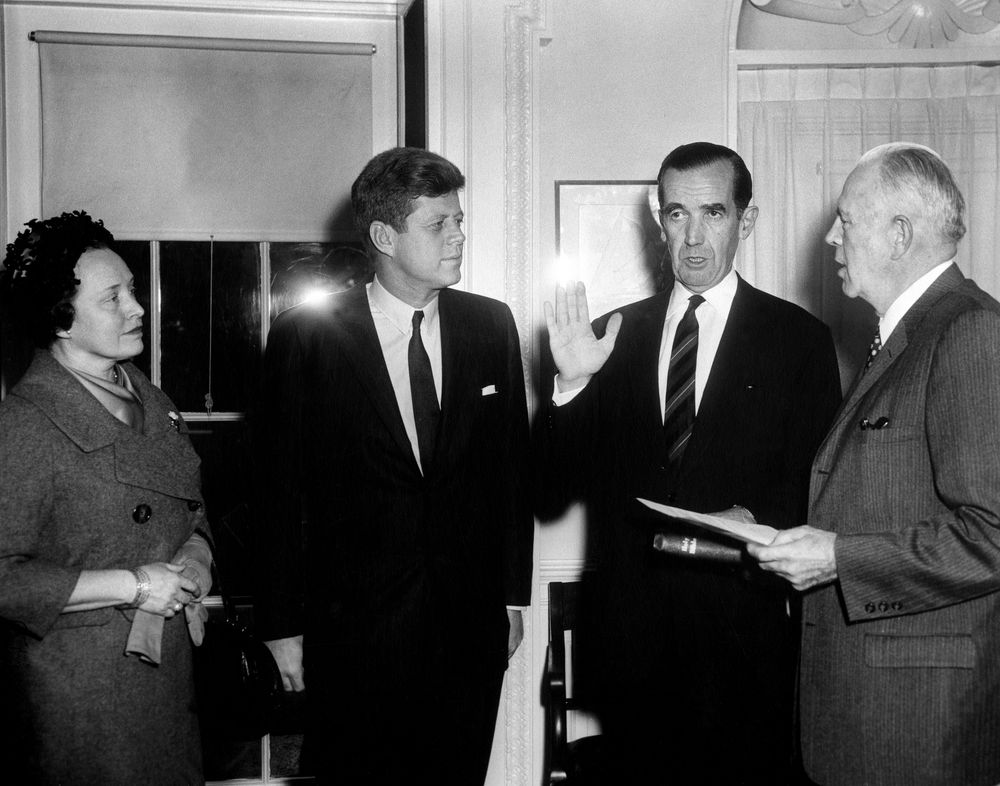Edward R. Murrow Apologizes for Censorship
President John F. Kennedy sworn in Edward R. Murrow as Director of the United States Information Agency (USIA) on March 21, 1961.

March 21, 1961. Swearing-in ceremony for Edward R. Murrow as Director of the United States Information Agency (USIA). White House Administrative Officer, Frank K. Sanderson, administers oath to Edward R. Murrow; President John F. Kennedy and Janet Brewster Murrow stand at left. Oval Office, White House, Washington, D.C. Abbie Rowe. White House Photographs. John F. Kennedy Presidential Library and Museum, Boston.
Edward R. Murrow apologizes for censorship – Video Link
USIA Director Edward R. Murrow responds in this 1961 audio recording to a question from a Voice of America reporter about Murrow’s unsuccessful attempt to censor his own documentary “Harvest of Shame.” The documentary about migrant agricultural workers did not present the United States in the best light and, in one of his first official acts as USIA Director, Murrow secretly tried to get the BBC not to run it. The BBC refused his request and the media found out about it. In his response to a VOA Pakistani Service reporter, he called his actions “foolish,” admitting that he had made a mistake.
During the Cold War, as a U.S. government official, Edward R. Murrow led the propaganda war against the Soviet Union and against global communism.
In a declassified 1961 memo, as USIA director, he wrote:
EDWARD R. MURROW: Decisions by the President call for an energetic campaign of persuasion — by diplomacy and propaganda — to unify Latin America against Castro, to isolate and ‘quarantine him,’ to nullify his potential for subversion, and ultimately so to weaken him in Cuba and in the rest of Latin America that his Cuban opponents (and Hemisphere pressures) can overthrow him.
Even before he joined the U.S. government, Edward R. Murrow applauded government efforts to counter propaganda of racial and class hatred. In a 1943 radio broadcast, he strongly supported the activities of the Office of War Information (OWI) — VOA’s parent agency — precisely because he knew that VOA practiced anti-Nazi propaganda and even psychological warfare. He may have not known at the time that wartime VOA and its parent agency were also spreading Soviet propaganda and Soviet lies. This became a major controversy, one of many which led to the OWI being abolished in 1945 and to the passage of the 1948 Smith-Mundt Act which restricted use of public money to distribute VOA programs in the United States (some of the Smith-Mundt restrictions were recently weakened, which also produced a controversy). Shortly after the war’s end, VOA was moved to the State Department and in 1953 to the United States Information Agency.
Contrary to some claims, Edward R. Murrow did not “help to create VOA.” He had nothing to do with VOA in the early years of its existence. During World War II, he broadcast truthful news from London for CBS, while Voice of America’s pro-Soviet broadcasters repeated Soviet propaganda lies, following in the footsteps of New York Times correspondent Walter Duranty. Duranty’s misleading reporting was designed to protect the Soviet Union and Stalin from criticism, which is what VOA did during the war. VOA’s pro-Soviet propagandists repeated the Kremlin’s lie about the murder of thousands of Polish military officers in Katyn, while Murrow reported truthfully that the Soviets were responsible for the mass murder. Murrow also reported on Stalin’s betrayal of the 1944 Warsaw Uprising, while VOA, in line with what the Soviets wanted, mostly ignored the non-communist Poles and their underground army fighting the Germans in Poland. Soviet propaganda called these anti-Nazi Poles Fascists and reactionaries.
There could not have been a greater difference between Edward R. Murrow and the radically left-leaning, pro-Soviet VOA propaganda officials and many of VOA’s early broadcasters who were hired by John Houseman, later called the first VOA director. He was forced to resign in 1943. FDR’s friend and foreign policy advisor, Under Secretary of State Sumner Welles, informed the White House that Houseman was hiring Communists. U.S. Army Intelligence recommended that he not be allowed to travel abroad for the duration of the war. The State Department refused to issue him a U.S. passport.
Despite Houseman’s departure, VOA’s pro-Kremlin broadcasts continued until the end of the war and possibly for a few more years. VOA’s early broadcasts would have met with strong disapproval from Edward R. Murrow. There was a striking difference between Houseman and Murrow who had nothing to do with the creation of VOA and had only limited impact while he served as USIA director. He was, however, a strong believer in truthful journalism and had an extraordinary talent as a reporter.

